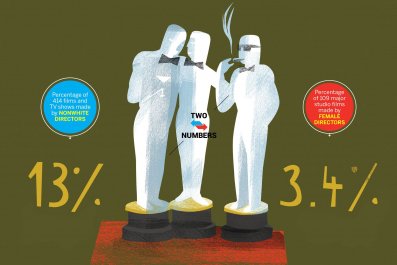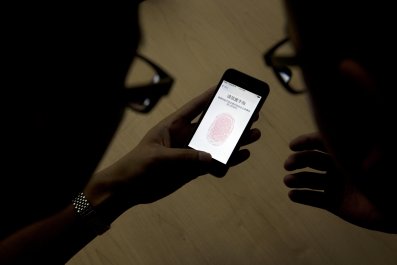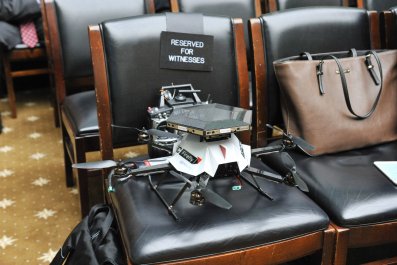Would you stop buying Apple's products if it decided to help the FBI open a terrorist's iPhone?
I thought not. Asking that today is like asking people in 1950 if they'd quit buying Lucky Strikes because cigarettes turn your lungs into tar pits.
Which is to say that Apple CEO Tim Cook, in his refusal to help the FBI break into iPhones, is ahead of most of the population. But maybe not all that far ahead. His very public stance might even turn out to be the smartest thing he's done for Apple since becoming CEO.
Give it a couple more years, and unwanted encroachments on your privacy will become the high-fructose corn syrup of technology. While consumers barely consider it now, a lot of folks in the tech industry think we'll soon be hyper-aware of the long-term dangers of giving up our privacy. In fact, this may be the year electronic privacy turns into a competitive weapon, and Cook may have just kicked the trend into gear.
Of course, Cook has already reaped a boatload of publicity for saying Apple won't create a backdoor tool that would allow law enforcement officials to get at the information stored inside an iPhone used by one of the San Bernardino, California, shooters. The tech community has been swooning. Many turn to the same kind of slippery-slope argument the National Rifle Association deploys at the first whiff of gun control: If the feds are allowed a little access now to a crazed killer's phone that he didn't even own (his employer owned it), next they'll be ransacking every citizen's digital files and arresting half the population for anti-government thoughts. Thank God, they say, Tim and Apple are around to say no.
The thing is, the most revealing stuff isn't usually locked inside our devices. The feds can glean way more from the digital remnants of all that killer's activity in the cloud: Google searches, WhatsApp messages, LinkedIn connections ("How do you know Abu Bakr al-Baghdadi?" "We've done business together"), calls made, locations navigated to, tweeters followed, songs Shazamed, websites visited. Every click and transaction is revealing and stored in some database, because the cloud is how we roll these days. Twenty years ago, investigators needed to snag a bad guy's hard drive to get anywhere. Now a person's intimate details are saved in company data centers.
We all give our privacy away every day, constantly, to a panoply of entities. I actually snorted a laugh when Facebook and Google proclaimed their support for Cook's position. Facebook and Google horde more data about us than any other commercial entities and make billions of dollars on it. Remember, their products are free; their core business is selling the details of our lives to advertisers.
At the moment, when most consumers say they're concerned about privacy, they're kidding themselves. A recent survey by TRUSTe and the National Cyber Security Alliance found that 92 percent of respondents who use the Internet said they worry about online privacy, yet 89 percent do not avoid businesses they feel are not respecting their privacy. "As emotional a topic as tracking can be, few people change their online behavior because of it or even bother to read the legalistic-to-the-point-of-unfathomable privacy policies that sites post," noted Rami Essaid, CEO of security firm Distil Networks, in a blog post.
In other words, our anxieties about this stuff are completely disconnected from our actions.
And encroachments on our privacy are only going to get worse. Wearables like Fitbits, smart home devices like Nest, connected cars and Internet of Things sensors are all creating ever more data about ever more detailed and intimate aspects of our lives. Artificial intelligence software can stitch together different kinds of data to paint a ridiculously accurate picture of an individual.
In many ways, we welcome this—the better technology knows us, the better it can serve us. But at what point does the exploitation of our details turn from convenience into invasion? And don't we want control of that knob—to understand and decide what we're agreeing to share?
Cook is making us think about all that now. Do most people care much about this one case, this one phone? Not likely. But this fight is making us realize that we need to make some decisions, individually and as a society, about digital privacy before it gets away from us. A cynic might say Apple can afford to take this stand because it doesn't rely on selling advertising as a business model. But every company should take the public's interest in Apple's decision to heart. Privacy is rising to a new level of awareness.
Just before the Apple news broke, I was talking with veteran tech investor John Taysom, who is among those certain that companies are about to start to compete on privacy. He's putting his money into the trend. One of his investments, Privitar, is working on the hard problem of anonymizing user data while teasing out the bits that make a product or service useful to consumers and advertisers. Loads of other startups are leaping into the privacy-technology space.
Just as Tesla won big by making a car that's both a great product and good for the environment, Taysom predicts, digital companies will race to provide best-of-breed services while protecting and giving us control over our privacy. Companies that can do that will beat companies that can't.
Apple, so often on the forefront, seems to know this. The FBI said Cook's stand is a marketing ploy. In Cook's letter to customers, he snorted, "Absolutely not. Nothing could be further from the truth."
He added, "This is and always has been about our customers. We feel strongly that if we were to do what the government has asked of us—to create a backdoor to our products—not only is it unlawful but it puts the vast majority of good and law-abiding citizens, who rely on iPhone to protect their most personal and important data, at risk."
So, really, Cook's position may not be a ploy. It could turn out to be brilliant marketing.




















